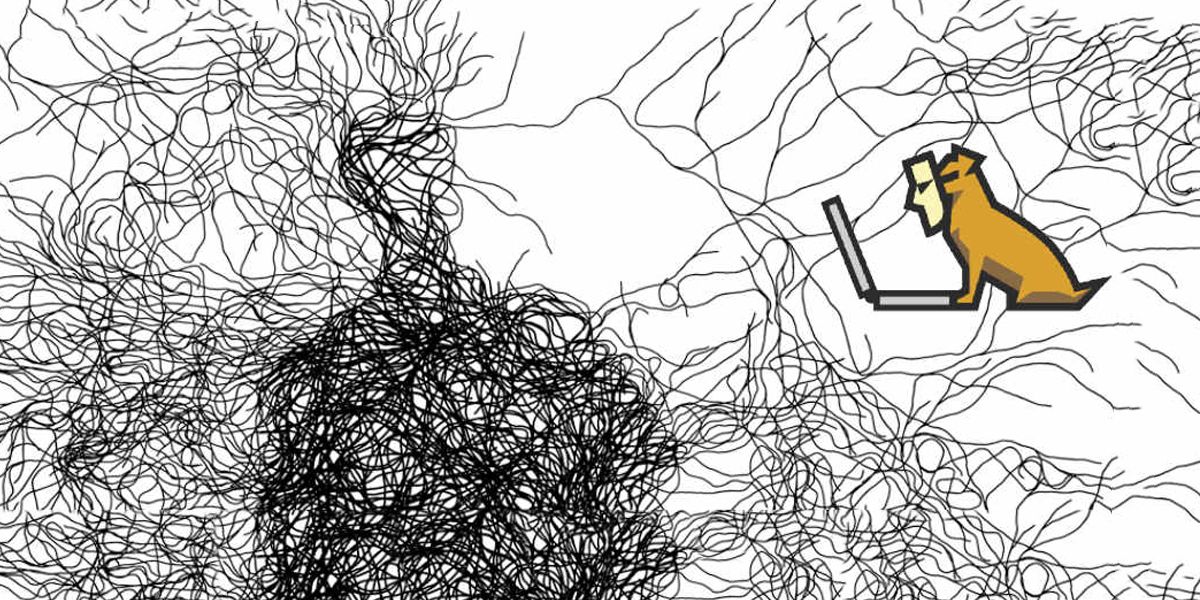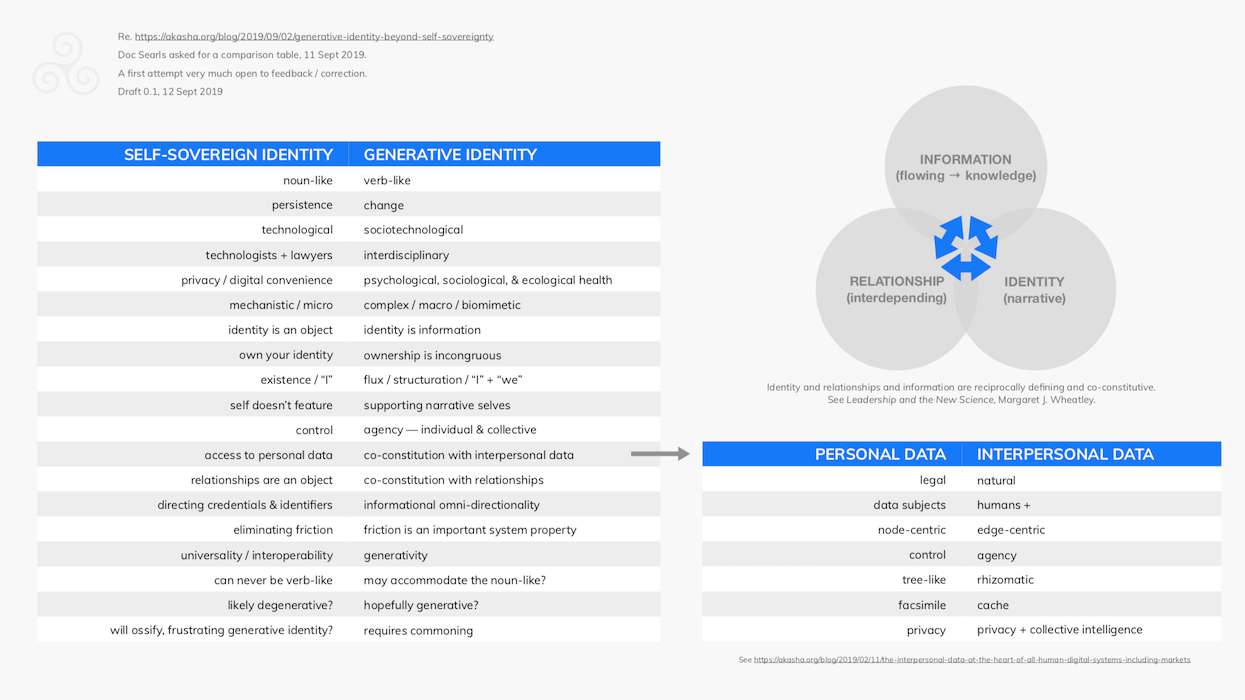A call for interdisciplinarity — generative identity and the Internet Identity Workshop

The post Generative identity — beyond self-sovereignty (2nd September) has spawned a lot of conversation in private channels and on the ProjectVRM Harvard mailing list ... some 15,000 words in exchanges with more than a dozen people active in ‘digital identity’. This post is dedicated to the most salient parts by way of making a contribution from a distance to the 29th Internet Identity Workshop (IIW) taking place this week at the Computer History Museum in Mountain View, California. Living eight time zones away, I have not yet had the opportunity to attend an IIW, and this occasion is no exception unfortunately.
This is a call to action. Whether it succeeds or not in that respect will depend in good part on how well I’ve been able to communicate the severity of the problem with the current trajectory — in terms of our psychological, societal, and ecological health — and how well I’ve been able to make the ethical case for the urgency of interdisciplinarity. Beyond that, it is in the hands of those leading the ‘identity community’.
For the avoidance of any doubt whatsoever, I have no reason to criticize the personal values and aspirations of any individuals with whom I’ve been privileged to engage in this community. No-one here wants to achieve the opposite effect to the one they set out to secure. These are quite simply impossible matters to approach through a mono-disciplinary lens — hence my objective to help open this out at the earliest possible opportunity.

Reviewing the proposed topics for this week’s IIW event, it’s clear that it’s as dedicated to identification (a claims verification process) as it is identity. But perhaps that’s not quite right either. When considering the RWOT functional definition of identity — identity is how we recognize, remember, and ultimately respond to specific people and things — and contrasting it with the IIW’s logo and agenda, it is perhaps more accurate to say that the workshop is dedicated to anonymity and privacy.
While the ‘Internet Anonymity and Claims Verification Processes Workshop’ doesn’t quite have the same ring, this isn’t a trivial observation. Two significant ramifications come to mind.
The first is simply that some people think they’re working directly on identity when they are in fact working directly on anonymity and claims verification processes, this response for example:
identity in the world is mostly what I do when another needs to know something about me.
In doing anything (and sometimes by not doing anything!), you take in, process, and send out information in the context of relationships. And this is not constrained to "when another needs to know". We cannot help take in, process, and send out information all the time in the context of relationships, all of which contributes to our multiple concurrent identities (in the verb-like sense, in the narrative sense, in others' eyes). Hence the generative identity principle of co-constitution.
The second ramification is that those working directly on anonymity and claims verification processes are in fact working indirectly on identity because the conceptualizations overlap inseparably, and they are then operating in the identity zone so to speak without, it seems, appropriate context and framing.
It’s not too much of a stretch to moot that most people in the ‘identity community’ have a working appreciation for noun-like identity and almost none for the essential, quotidian verb-like. I consider this a shortcoming of the shared endeavour rather than anything personal. Here’s a response I offered to someone deliberately avoiding “identity” in describing their work:
In working with medical information, in working with medically-oriented relationships, you are 100% working with verb-like identity ... Not referencing it specifically doesn't change the fact. Medical information and relations with physicians aren't merely associated with 'an identity', they manifest in ever-changing identities. In other words, they shape 'who we are' in contexts and 'how we become' in contexts.
These two ramifications are perhaps the most significant insight of my past four weeks. I attribute it to my observation in the generative identity post that the ‘identity community’ appears to be almost entirely mono-disciplinary — technological, with a smattering of legal expertise. At minimum we’re missing psychologists, sociologists, ecologists, and complexity scientists. No-one has countered otherwise, meaning we likely have a state of affairs I describe in the generative identity post as unethical by itself — and it’s not too hard to appreciate then why ‘digital identity’ might not be heading for a good place. (It’s also noteworthy that the community is unrepresentative, being predominantly white and male.)
Could the individual ‘user’ do with some anonymity and the individual agency to present verified claims? Yes indeed, sounds good. But as a complex human being woven into the complexities of society and the complexities of the broader environment, Alice’s best interests can only be served when interdisciplinary teams determine to anticipate the emergent consequences of their work, and indeed design for it. The best way to serve Alice and Bob is to work towards the benefit of the species and therefore our environment. The best way to serve the species is to support Alice et al in their diversity and agency within the complex adaptive system we call society. In other words we have to design for all scales and varied contexts.
And yet astonishingly just one interlocutor to date has made fleeting reference to my emphasizing emergence, and there has been very little acknowledgement of this being a sociotechnological rather than merely technological system. On the contrary:
[The SSI discussion seeks] to separate the political ambitions of SSI from its technical realization. … I recommend a similar tactic for your "generative identity". IMO, it conflates the political with the technical and as such, undermines both. Those who care about either will get caught up in nits about the other.
This artificial separation of the social / political and technological is at the heart of the problem here. They are of course utterly inseparable. To design the latter in the vacuum of the other is unethical, and frankly dangerous (by which I mean people will suffer in consequence). As Einstein noted, everything should be made as simple as possible, but not simpler. What is described here as “caught up in the nits,” I recognize as simpler than possible. Generative identity is the antithesis of this recommendation to repeat this error. (See the section in the generative identity post on "separation of concerns".)
If any ‘identity community’ has, say, technologists representing more than a third of the collaborative group, then by definition other essential disciplines are under-represented and any recommended architectures will more than likely be fundamentally flawed. And given that we’re designing something so incredibly close to the human condition and the fundamental fabric of our societies, where very many people have been excluded, persecuted, and murdered with the assistance of prior identity architectures, this would be unacceptable. It’s why I tend to write ‘identity community’ in single quote marks — it cannot constitute community with its current homogeneity.
‘Digital identity’ today lacks the requisite variety of disciplines, conceptualizations, and protocols to rise up to the complexities of the human condition, of societies, of ecology. Given the frictionless medium, the virality of human relations, and the support of governments, the emergent and potentially rapid consequences of this trajectory are frightening. A system adhering to or influenced by the founding SSI principles will I believe, ironically enough, be utterly disempowering for the individual, through emergence, through structuration.
So what of those founding principles I critique in the generative identity post, and the associated characteristics and consequences?
I’ve been told that the principles are three years old, and:
... have served as a rallying cry, not a blueprint. SSI has evolved greatly over the last three years and will continue to evolve. No one takes them out in meetings and measures what we’re doing against the principles.
I have not been pointed to a revised set of principles. This urges a polemical question — does this mean SSI currently has no principles?! Ethically, a set of principles must be determined in interdisciplinary forum and they most definitely should be taken out in meetings to guide and assess progress. Generative identity offers a distinct set of candidate principles.
[UPDATE 4 Oct 2019 — a Twitter exchange about Sovrin's principles.]
As for contrasting the characteristics and consequences of SSI and generative identity, I drafted the following comparison table for convenience, you can download it as a .pdf here:

I was challenged by a leader of Sovrin:
It’s easy to argue against something if you get to define it and make it anything you like so that you can use it in contrast with the thing you’d like to promote. … you’ve created a caricature of SSI that no one working on it would recognize. In fact, if someone were to describe Sovrin using the phrases in your generative identity column, I’d say they were right on.
This attracted support from a fellow Sovrin leader:
What you call "generative identity", Philip, is what I call "SSI done right".
The generative identity post argues that identity cannot be self-sovereign by the RWOT functional definition. It describes the flaws in four founding / “rallying cry” principles. But no-one has yet engaged with the critique at this level of detail. My response to these objections:
If this is “SSI done right”, that would be wonderful. Just because I don’t see it doesn’t mean it isn’t. But I don’t see the co-constitution principle in the architecture, or attendance to near inevitable emergent outcomes, or a refusal to accommodate propertization, or much interdisciplinary deliberation, etc., but I will keep looking and learning!
... As I’ve noted ... generative identity is little more at the moment than an identifier for a set of draft principles that I consider distinct from what I’m seeing manifest under the banner of SSI. Well, there are a few embryonic sketches … but it is very much not a “thing [I’d] like to promote” but rather related to outcomes my AKASHA colleagues and I care about deeply.
Yes, we all want to empower individuals, enhance agency, defend privacy, etc. but because the object here is the very essence of the sociotechnological — the very sense-making capacity of organizing and living and cohabiting this planet, whether actors here recognise that or not — the corresponding protocols and architectures will have far greater influence on our potential to reach a generative stage in the Anthropocene than the WWW to date. And given path dependencies and equilibria, we may only have the one chance to get it right in good time.
I do hope this conversation continues, openly ideally, but privately as needed. It would, I humbly propose from a distance, make for a valuable session at IIW this week.
We’re hoping to convene a suitably interdisciplinary community, or community of communities, and we will need your help. If you or your organization or community can help make this happen — if you understand the need for some deep and meaningful interdisciplinary action — please get in touch now. Thanks in advance.
Appropriately, I will finish this post with a contribution from a practitioner of one of those disciplines we need at the table — a knowledge ecologist. Christina Bowen traces the transformation of information to knowledge in human systems the way an ecologist might follow the transfer of sunlight to different forms of energy moving through a wetland. Indeed, her career started in wetland ecology.
If identity is what we do together, looking to the living systems surrounding us makes sense. Generative identity is created not by drawing the right boundary at the right time, but by paying attention to the flows across those boundaries. Like cell membranes, identities and identity systems must change and move according to changing conditions.
While the identity conversation in the bleeding edges of tech goes on, a parallel conversation in legal and ecological fields is arising. Rivers are being given the legal rights of people. People are imagining forests that pay to be harvested in a manner that suits them.
Identities allow action, and provide protection.
If we cannot discover the perfect implementation of digital identity, the least we can do is to look beyond the boundaries of tech discussions and white papers, and learn more about the needs of people, the flows of nature, and the nature of boundaries.
